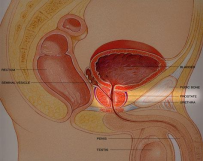Prostate Cancer
Prostate cancer is a disease where cancer develops in the prostate gland, a gland located solely in the male reproductive system. Prostate cancer develops mostly in men that are over the age fifty, but it is recommended by authorities to start annual checkups for men in high-risk groups over the age of forty. It is possible for the cancer cells to metastasize (spread) from the prostate to other body parts such as the bones and lymph nodes, so early detection is critical. The specific causes of prostate cancer remain unknown, but factors such as age, genetics, race, diet, lifestyle, medications, as well as other factors are related to the cause, with age being the primary risk factor.
More Information
Prostate Cancer | Treatment
There are options when it comes to treatment of prostate cancer. Which option is best depends on several things: the stage of the cancer, your PSA level, Gleason score, your age your general health. Also a factor that is discussed with your physician is feelings about the potential treatments as well as their possible side effects. Treatments offered by the Northwoods Urology clinicians include:
- Robotic Prostatectomy or ("da Vinci Prostatectomy")
- Conventional Open Prostatectomy
- External Beam Radiation Therapy (also called IMRT, or IGRT)
- Radioactive Seed Placement (Prostate Brachytherapy)
- Cryotherapy (Freezing the prostate)
- Hormonal Therapy
- Watchful Waiting or Expectant Management (closely following the cancer with no intervention)
More Information
Prostate Cancer | Treatment
There are options when it comes to treatment of prostate cancer. Which option is best depends on several things: the stage of the cancer, your PSA level, Gleason score, your age your general health. Also a factor that is discussed with your physician is feelings about the potential treatments as well as their possible side effects. Treatments offered by the Northwoods Urology clinicians include:
- Robotic Prostatectomy or ("da Vinci Prostatectomy")
- Conventional Open Prostatectomy
- External Beam Radiation Therapy (also called IMRT, or IGRT)
- Radioactive Seed Placement (Prostate Brachytherapy)
- Cryotherapy (Freezing the prostate)
- Hormonal Therapy
- Watchful Waiting or Expectant Management (closely following the cancer with no intervention)


